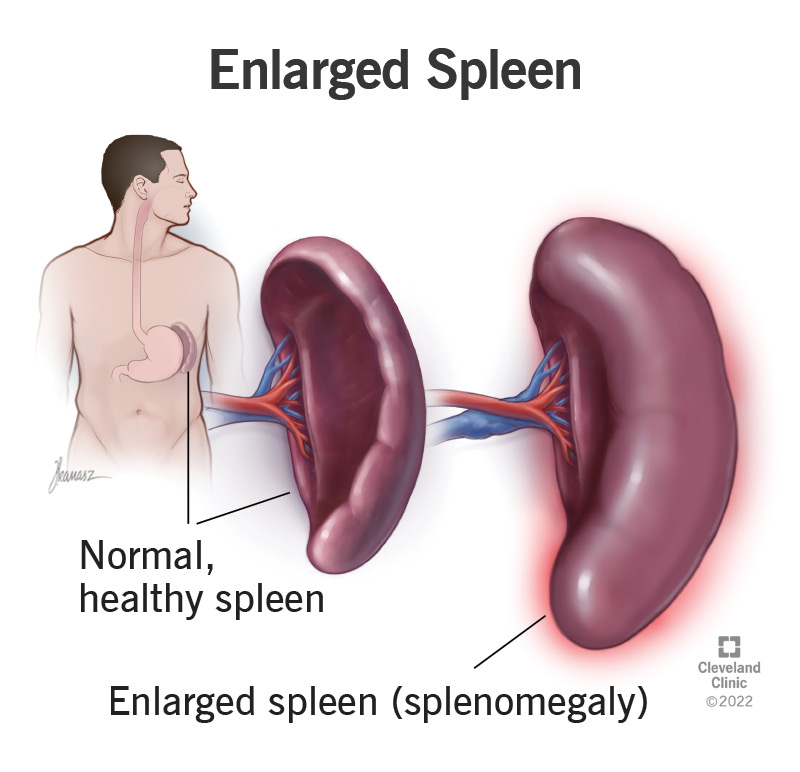An enlarged spleen is also called splenomegaly. It’s a symptom of an underlying disease. It could be a transient infection or something more serious. Your healthcare provider will treat it by treating the underlying cause.
Advertisement
Cleveland Clinic is a non-profit academic medical center. Advertising on our site helps support our mission. We do not endorse non-Cleveland Clinic products or services. Policy

Image content: This image is available to view online.
View image online (https://my.clevelandclinic.org/-/scassets/images/org/health/articles/17829-enlarged-spleen)
Your spleen is a normally fist-sized organ that’s located on the upper left side of your abdomen, under your left ribcage. Your spleen belongs to your lymphatic system and your immune system. It filters your blood, removes waste products and produces white blood cells to fight infections. Conditions affecting the spleen itself or the blood that passes through it can cause it to become swollen and enlarged.
Advertisement
Cleveland Clinic is a non-profit academic medical center. Advertising on our site helps support our mission. We do not endorse non-Cleveland Clinic products or services. Policy
A normal, healthy spleen is up to 12 cm long and 70 g in weight. An enlarged spleen may be up to 20 cm long and can weigh more than 1,000 g. Several things can cause your spleen to enlarge, including inflammation, fat storage, pooled blood, benign or malignant growths and overproduction of cells. Some causes are temporary and others may indicate a chronic or progressive condition.
An enlarged spleen is a symptom of many different conditions, some more serious than others. Your healthcare provider will need to investigate the underlying cause to determine if you need treatment. If an enlarged spleen goes untreated for a long time, it could eventually begin to malfunction. In rare cases, a severely enlarged spleen could rupture, which could cause internal bleeding.
You may not be able to tell if you have an enlarged spleen. If you do have symptoms, they might include:
If your spleen is beginning to malfunction, you may notice:
Advertisement
Common causes include:
Other possible causes include:
You might come to your healthcare provider with symptoms of vague abdominal discomfort, or you might have symptoms related to your underlying condition. Sometimes, healthcare providers find an enlarged spleen by accident during a routine exam, or while looking for something else. Your provider will likely be able to feel your enlarged spleen during a physical exam. It can also show up in imaging.
You may have various medical tests to confirm an enlarged spleen and help isolate the cause, including:
Advertisement
In many cases, the spleen will return to normal size as the underlying condition improves. Some conditions, such as transient infections, may go away by themselves. Your provider may treat other conditions with medication, blood treatments or surgery. Some have no cure. In these cases, healthcare providers may treat your enlarged spleen with low-dose radiation therapy to reduce it, or surgery to remove it.
You can live well without your spleen, but you will have reduced immunity to infections. Your healthcare provider will recommend certain vaccines to protect you against some of the most common infections you may be more vulnerable to. They will recommend you wear a medical ID bracelet alerting medical professionals to your absent spleen. They may prescribe stronger antibiotics when you do get sick.
If you have a chronically enlarged spleen, be careful to avoid trauma to your abdomen. An enlarged spleen is more vulnerable to rupture. It's best to avoid high-contact sports. Your spleen may also be at risk of losing its functionality, or of becoming overactive. Look out for signs of anemia, such as paleness and fatigue. Your healthcare provider may want to check your blood levels periodically.
Advertisement
Healthcare providers aren’t sure if your diet directly affects your spleen, but it does affect your overall health. If you have an enlarged spleen, you can consider yourself immunocompromised. A healthy diet is one of the easiest ways to help protect your immunity. It may also influence the underlying health conditions that are causing your enlarged spleen, especially inflammatory conditions and liver disease.
Healthcare providers will always recommend that you avoid or minimize fast and processed foods, including packaged snacks, sweets and deli meats. These foods are highly inflammatory, and they promote LDL cholesterol, which is bad for your liver and metabolism. An anti-inflammatory diet emphasizes fresh, whole foods and unsaturated fats, such as those found in fish and nuts.
If you notice increased pain in the area of your spleen or your left shoulder, especially if it's worse when you breathe in, seek medical attention right away. A rupture is more likely to happen after an impact to your abdomen, but sometimes it happens by itself. Even a small rupture and a slow bleed can suddenly become urgent if it isn’t treated in time. Earlier treatment may also prevent the need for surgery.
Advertisement
An enlarged spleen is a symptom that healthcare providers need to investigate. Whether or not it’s causing you discomfort, it indicates an underlying condition that may need treatment. When it’s temporary, an enlarged spleen won’t harm your overall health. But chronic swelling could damage and endanger your spleen. Your healthcare provider will treat it by treating the underlying cause.

Sign up for our Health Essentials emails for expert guidance on nutrition, fitness, sleep, skin care and more.
Learn more about the Health Library and our editorial process.
Cleveland Clinic’s health articles are based on evidence-backed information and review by medical professionals to ensure accuracy, reliability and up-to-date clinical standards.
Cleveland Clinic’s health articles are based on evidence-backed information and review by medical professionals to ensure accuracy, reliability and up-to-date clinical standards.
If you have issues with your digestive system, you need a team of experts you can trust. Our gastroenterology specialists at Cleveland Clinic can help.
